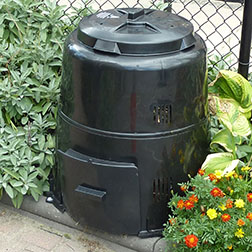This past weekend I discovered why my roommates did not want to compost in our apartment. To my shock and dismay, my friends actually thought composting occurs in the kitchen, or bin where you collect your compost. They thought it would be smellier than normal garbage!
So, what exactly is compost?

Compost is simply decomposed organic material of plant material or animal matter. While composting may seem mystical or complicated, it is actually a very simple and natural process that occurs in nature, without any assistance from humans.
Compost is the result of a natural decomposition cycle; it is a combination of digested and undigested food that breaks down to create healthy soil. “Backyard” composting is a little different. It is the intentional and managed decomposition of organic materials for the production of compost. Does it still sound so mystical? It's no myth, Compost is just dirt! It is magical soil enhancer that is fundamental to good gardening. Anyone can manage the composting process, even college students. In fact, if you have organic matter [i.e. leftovers], it’s virtually impossible to prevent decomposition. The important part is to maximize the process of decomposition. Compost is good; sloppy garbage heaps and rotting food are bad.
How do you compost?
- The first step is collecting. What do you collect? All organic matter: food scraps, veggie peels, shells, soiled napkins, nuts, coffee grounds, and so much more! All you have to do it have a collection container [i.e. smaller garbage can] and you are halfway there.
- Here at Green City Growers we have an Earth Machine. The Earth Machine is a barrel that sits outside the office, behind some foliage. Once our kitchen collector is full, we empty it into the composter and mix the material into the existing pile using a pitchfork or other garden tool to turn the compost. This adds oxygen, a key component to successful composting!
- Next, we cover the food waste with a handful of old leaves, other dried yard waste, paper material (such as cardboard) or soil. This will add carbon and reduce the chance unwanted visitors like fruit flies. Then the lid is put back on to let it cook.
- Inside of the Earth Machine we have Red Wiggler worms. No, it is not gross! They help speed up the composting cycle and break down the organic matter inside the Earth Machine. Then, Kablam! In about six-twelve weeks time, we have soil for our Research and Development Garden out front.

Why is composting so good?
Compost is good for two very compelling reasons: first, It’s great for the garden and second, it’s environmentally sustainable and responsible. Compost is great for the garden because it improves the soil, which in turn supports healthier and more productive plants by providing all of the essential nutrients for healthy plant growth. Compost also improves the soil’s structure, which makes it easy for soil to hold and use moisture and air. The largest environmental benefit is that composting can significantly reduce the amount of solid waste that would otherwise find its way into the trash collection and dumping cycle. The more we compost, the less we contribute to the landfill, cost and volume of trash removal. Using compost to feed your lawn or garden will also reduce your dependency on chemical fertilizers. So, you can save money and reduce chemical pollution in the environment. Are you sure compost does not smell? On the contrary, if you are composting right your compost bin should never smell! Your collecting bin should smell just as normal as your garbage can! So in conclusion, worms are good, composting is easy, and you should do it.
Start composting today! Come to a GCG workshop on building your very own raised bed, and use your compost to fill it up!



